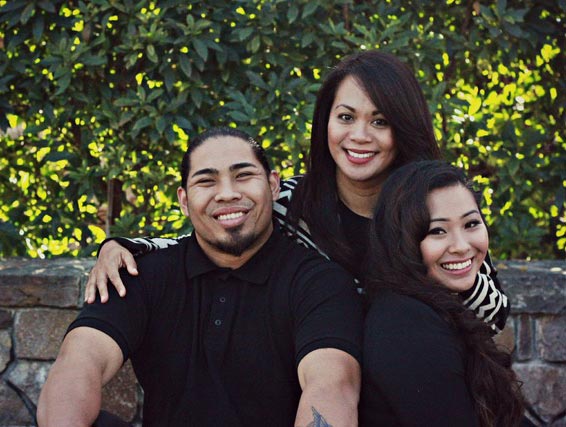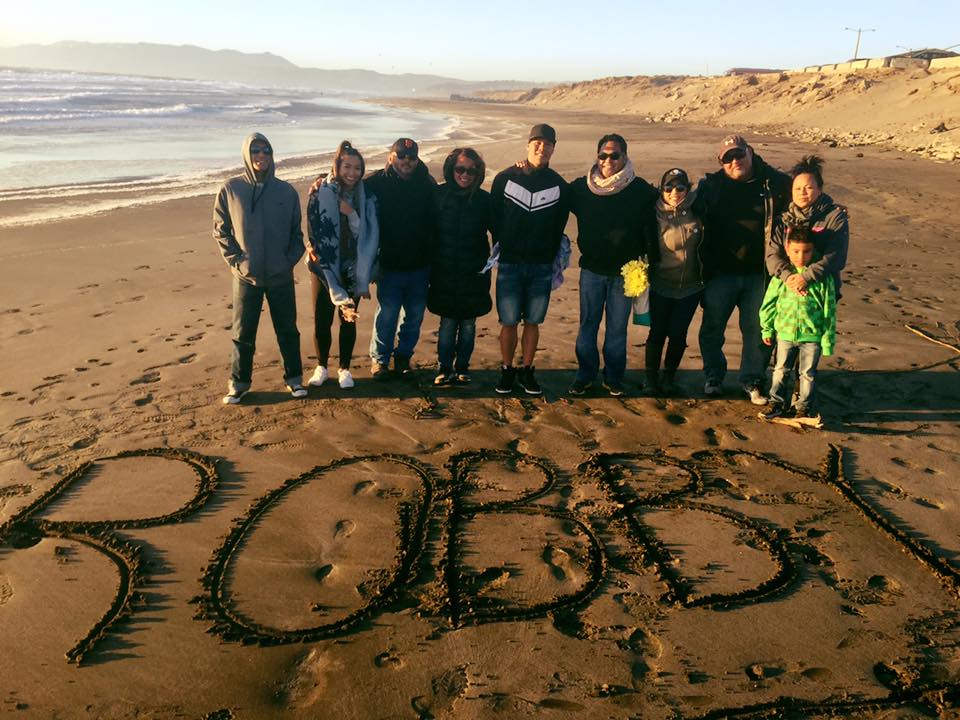My Story of Hope
/Pati Poblete (center) and her children Robby and Julie (Photo courtesy of Pati Poblete)
I think about my time as a copy editor, first at the Vallejo Times-Herald, making $9.75 an hour, where I eventually became the Community Editor. At the time, the city was facing a record number of homicides, which we reported on. Local businesses were threatening to pull their ad money because they claimed we were hurting the city’s image. But we continued because the lives of these victims were worth more than the cost of a half-page ad.
I went on to the Alameda News Group, where I became the News Editor for the Daily Review in Hayward, editing stories and determining what made the front page. I think about my time at the Santa Rosa Press Democrat, and then finally The San Francisco Chronicle -- where I found my voice and became the first Filipina American columnist at the paper.
“My son, Robby, was shot and killed in broad daylight on Sept. 21, 2014. I was filled with shock, grief, pain, anger and confusion. I felt helpless and hopeless. I had PTSD and could not return to the city where he was killed. I wanted to disappear. But then I began to write.”
I was not shy about writing on issues specific to Filipino Americans – from the challenges of an economy based on remittances, to my own family’s tragedy with Muslim terrorists in their hometown in Mindanao, to the struggle of our women in a culture obsessed with western features – bleaching our brown skin into a translucent white; breaking our native noses and restructuring them into more narrow, more elevated structures. Sometimes these columns and my opinions were not popular in the community – but it started discussions, and it got people involved.
What I discovered after revisiting these jobs is that once you are a journalist – you are always a journalist. Because at the heart of it is truth. At the heart of it are stories that you hope will raise awareness, affect change, and maybe, hopefully, inspire. At no time in recent history has this been more needed, both here and in the Philippines.
Though the industry is evolving, and some would say declining, quality journalism is critical to shedding light on the injustices and atrocities that we are facing today – politically, socially, environmentally. More and more, we are facing leaders who question the validity of our craft, labeling it fake news because of fear. Fear that the truth will prevail. Fear that the people who read these stories will unite and call for change. Fear that they will be held accountable for their actions.
But the truth and these stories are not always easy.
My son, Robby, was shot and killed in broad daylight on Sept. 21, 2014. I was filled with shock, grief, pain, anger and confusion. I felt helpless and hopeless. I had PTSD and could not return to the city where he was killed. I wanted to disappear.
Robby, at Ocean Beach (Photo courtesy of Pati Poblete)
Friends and family remembering Robby at Ocean Beach on the anniversary of his death (Photo courtesy of Pati Poblete)
But then I began to write. First, letters to my son. Then, chapters of a book. Then a mission statement for a foundation – his foundation. And then an opinion piece on gun violence for The San Francisco Chronicle, and another, and another. Through writing, I found a way to keep my son’s spirit alive and turn my grief into something powerful and positive. Through writing, I was able to rebuild.
The Robby Poblete Foundation seeks to reduce gun violence by collecting unwanted firearms through gun buybacks, and then transform them into instruments of hope and opportunity through art and vocational skills programs for young adults and ex- offenders. Because even though the foundation bears my son’s name, it is the people who killed him that we must think about. What brought them to this place? How could we, as a society, have prevented them from believing that crime was their only answer?
Volunteers of the Robby Poblete Foundation (Photo courtesy of Pati Poblete)
We must create opportunities for our youth and young adults. We must offer ways for ex offenders to rebuild their lives. Because no one is beneath redemption. When we help them, we help our own children, by giving them a safer, more hopeful, society.
Already, we have gotten support from Congressman Mike Thompson, Chair of the Gun Violence Prevention Task Force in the U.S. House of Representatives. We held our first gun buyback on Aug. 26, where we collected 66 handguns, 111 long guns, and 3 assault rifles. We now have an open call for artists who will turn the gun metal into pieces of art that will raise awareness about gun violence. And I have partnered with labor unions, school districts, correctional facilities and county representatives to establish vocational programs that will give people skills and create opportunities.
But I could only get to this point by sharing my story. There are more than 3800 stories that must be told in the Philippines. More than 3800 stories of loved ones who were victims of extrajudicial killings. The difference between their stories and mine is that my son’s killers await trial where I pray that justice will be served. There is no justice for these victims or their families. Their only weapons now are journalists – those who will tell of their tragedies.
I do this for my son, who deserved better – and my daughter, who is still here and needs to believe that there is hope. Whatever your motivation to share your story and affect change in this world, do not stop.
Justice Louis Brandeis of the U.S. Supreme Court once said: “Publicity is justly commended as a remedy for social and industrial diseases. Sunlight is said to be the best of disinfectants; electric light the most efficient policeman.”
Journalists are and must continue to be the sunlight. Our generation and future generations depend on it. – Taken from a longer keynote speech delivered at the 6th Plaridel Awards for Filipino American Journalism, October 5, 2017.
Pati Poblete is the founder and executive director of The Robby Poblete Foundation. She is the author of “The Oracles: My Filipino Grandparents in America” and the upcoming book, “A Better Place”, to be released in 2018. For more information on The Robby Poblete Foundation, go to robbypolbetefoundation.org.






